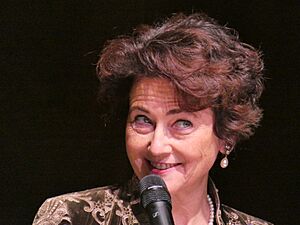Edith Heard facts for kids
Quick facts for kids
Edith Heard
|
|
|---|---|
 |
|
| Born | 5 March 1965 |
| Nationality | British, French |
| Alma mater |
|
| Spouse(s) | Vincent Colot |
| Awards |
|
| Scientific career | |
| Fields | |
| Institutions |
|
| Thesis | Analysis of a gene amplification event in rat cells (1990) |
| Doctoral advisor | Mike Fried |
Edith Heard (born 1965) is a British-French scientist. She is a leading researcher in epigenetics. This field studies how genes are turned on or off without changing the DNA itself.
Since January 2019, she has been the Director General of the European Molecular Biology Laboratory (EMBL). EMBL is a top research center for life sciences. She is also a Professor at the Collège de France. In 2025, she became the CEO of the Francis Crick Institute in London, UK.
From 2010 to 2018, Heard led the Genetics and Developmental Biology department at the Curie Institute (Paris) in France. She is well-known for her important work on X-inactivation.
Contents
Edith Heard's Education
Edith Heard studied Natural Sciences at the University of Cambridge. She earned her first degree in 1986.
In 1990, she received her PhD from Imperial College London. Her research looked at how genes can make more copies of themselves in rat cells. She did this work at the Imperial Cancer Research Fund Laboratory in London.
Career and Research
Edith Heard's main research areas are genetics, epigenetics, and how living things develop. She focuses especially on X-inactivation. This is a process where one of the two X chromosomes in female mammals becomes inactive.
Understanding X-Chromosome Inactivation
Heard began studying X-inactivation in the 1990s. She worked on understanding how this process starts. In 2000, she discovered early changes in the cell's genetic material during X-inactivation.
In 2001, Heard started her own lab at the Institut Curie. Her team found that X-inactivation happens twice during development. First, it happens in cells that form the placenta. Then, it happens again in cells that build the embryo.
New Research Methods
Heard developed special methods to study single cells. These methods allowed her to look at embryos and stem cells very closely. She discovered that X-inactivation is a very active process in early embryogenesis (the development of an embryo).
Her work also showed that X-inactivation strategies are different in various mammals. This includes differences between mice and humans. Heard also found that how chromosomes are organized inside the cell is important for X-inactivation. Her group also helped discover Topologically Associating Domains (TADs). These are special regions in the chromosome.
Leadership Roles
Heard has been a professor at the Collège de France. She holds a special position focused on epigenetics and how cells remember things. From 2010 to 2018, she directed a department at the Curie Institute (Paris).
Her lab moved to EMBL in 2019 when she became its Director General. In 2016, Heard helped create a program in France. This program supports scientists who have been forced to leave their homes due to war. Since 2021, she has also been a member of the science council for the World Health Organization (WHO).
Awards and Achievements
Edith Heard has received many important awards for her scientific work.
In 2017, she won the Inserm Grand Prix for her research in epigenetics. She was elected a Fellow of the Royal Society (FRS) in 2013. This honor recognized her discoveries in epigenetics and X-chromosome inactivation.
Heard has made several groundbreaking discoveries in epigenetics, through her studies on X-chromosome inactivation, the process of dosage compensation in mammals. Heard developed powerful single-cell techniques enabling the analysis of fixed and living embryos and embryonic stem cells. These led to one of her major discoveries, showing that X-inactivation is a highly dynamic process during early embryogenesis and revealing major differences in X-inactivation strategies in different mammals, from mouse to man. Heard has also performed pioneering work revealing that in addition to epigenetic modifications, chromosome organization and nuclear compartmentalization are important players in the initiation and maintenance of X inactivation.
She became an EMBO Member in 2005. She also won the Suffrage Science award in 2012. In 2020, she received the L'Oréal-UNESCO For Women in Science Awards. In 2021, she was elected a foreign Member of the National Academy of Sciences.
In December 2022, Heard was elected to the French Academy of Sciences. This was for her work on epigenetics and X-chromosome inactivation. On December 12, 2024, she received the CNRS Gold Medal.
She was also appointed a Companion of the Order of St Michael and St George (CMG) in the 2025 Birthday Honours. This was for her contributions to science and relations between the UK and France. In 2025, she received The Croonian Medal and Lecture for her leading work on X-chromosome biology.
Personal Life
Edith Heard is married to Vincent Colot, who is also a molecular biologist. They have two children.
 | Claudette Colvin |
 | Myrlie Evers-Williams |
 | Alberta Odell Jones |

